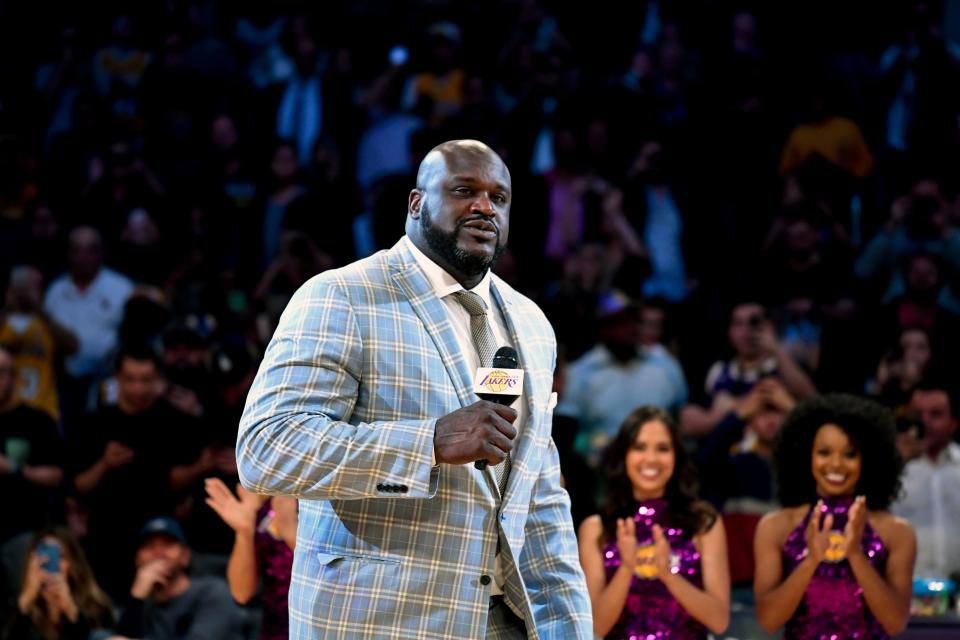3 million kids missing from school because of COVID-19: Shaquille O’Neal and Rey Saldaña
An estimated 3 million students in the United States have gone “missing” during the pandemic — not from home, but from virtual school. They are no longer attending classes and are most likely falling behind. Even after the pandemic ends, many might never go back.
We are devastated by that number. Not just as parents and as advocates for the nation’s children, but also as two people who grew up with family struggles and the difficulties brought on by economic instability. If the pandemic had happened at an earlier time in our lives, we or someone we know could have been one of those millions of kids.
For many low-income students, inequitable learning conditions are not new — but they have been exacerbated by the pandemic. It’s no surprise, then, that these same students are experiencing learning loss and chronic absenteeism at higher rates than their peers during the COVID-19 crisis. We can’t let that continue.
The solution is to provide whole-child supports that meet students’ needs outside the classroom: access to food, health care, afterschool programs, counseling, and housing and job referrals for parents. These essential services successfully get children in economically strapped families back to learning, and our nation’s leaders must prioritize funding them so that no student is missing from school.
Beyond buildings
As we near a year since thousands of schools first closed their doors last spring, President Joe Biden has made quickly reopening school buildings and getting millions of students and teachers back into the classroom a top priority. His plan focuses on safety first and offers $130 billion in funds for K-12 schools to help reduce in-person class sizes and take other steps to prevent COVID-19 transmission.
Figuring out how to get more students in the door as safely as possible is important. As difficult as community debates over school reopening have been, educators, parents and children agree that students learn best in the classroom. Many experts believe in-person learning will ensure the most at-risk children are less likely to be left behind.

But while returning to buildings might help reverse learning loss and bring some of the missing children back, it won’t solve the problem entirely if children are still hungry, if their social and emotional needs are unmet, and if their families are still struggling to afford health care and school supplies.
Families need options: Why school choice is essential to ensuring racial equality
An effective way to provide wraparound services that enable children to learn is by embedding nonprofit partners to coordinate them in schools, ensuring students’ needs are all met in one place. This approach, called integrated student supports, also benefits the schools, allowing educators to prioritize student learning while knowing families will get help. Schools require additional federal funding to provide these services, as well as coordinators to run them. It’s the only way to get kids back to in-person or virtual schoolrooms and prevent further learning loss, especially in low-income communities where students are falling off the most.
Proven models
This isn’t just a vision. It’s already working in 2,900 schools across the nation. Communities in Schools, a national education nonprofit, found that schools providing integrated students supports last year were able to keep 99% of students in the education system. Students and their families receive exactly the right support for them, no matter the mode of learning, whether it’s mental health checks and telehealth services, regular meal distribution, reliable internet access, or mentoring and academic support.

These wraparound services do more than just keep kids in school — they set them up for success.
Low-income kids were disadvantaged by the education system when we were in school, and they overwhelmingly still are today. The two of us were able to fulfill our potential because of organizations like the integrated student supports provider Communities In Schools and the afterschool network of Boys & Girls Clubs. Rey now leads CIS’ national network, and Shaquille founded The Shaquille O’Neal Foundation to fund out-of-school-time programs for the millions of kids who were forgotten long before the pandemic. These proven models have adapted to our time of social distancing, and they are helping kids get through a pandemic as well as through the difficulties of everyday life.
Education Secretary Miguel Cardona: Here's my five-point plan to get students back in school full time
There’s no sugarcoating it. The nation is failing students everywhere. In Los Angeles, one-third of high school students are not regularly logging on for online learning. In Houston, 42% of students received a failing grade last autumn compared with 26% in the fall of 2019. In Washington, D.C., students are now four months behind in math and one month behind in reading, compared with regular years.
We can do better. Whether schools are virtual, hybrid, or in person, we can meet every child’s most critical needs so that learning can go on, long after we put COVID-19 in the history books.
Shaquille O’Neal is founder of The Shaquille O’Neal Foundation, which helps underserved youth achieve their full potential, and a member of the national board of directors of Communities in Schools, the national organization that ensures all students are on a path to success. He is an alumnus of the Boys & Girls Clubs. Rey Saldaña is president and CEO of Communities In Schools. As a student, he was supported by Communities In Schools – San Antonio. Later, he served four terms as a San Antonio City Council member.
You can read diverse opinions from our Board of Contributors and other writers on the Opinion front page, on Twitter @usatodayopinion and in our daily Opinion newsletter. To respond to a column, submit a comment to letters@usatoday.com.
This article originally appeared on USA TODAY: Shaq, Rey Saldana: COVID is hurting school kids already in crisis

 Yahoo Movies
Yahoo Movies 
